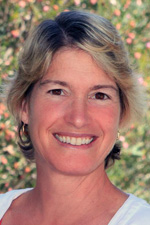By Eva Trieger

LA JOLLA, California — Hearing terms like “bug juice,” “arts and crafts time,” “bunks,” and “head counselor ” conjures up one mental picture: Summer Camp. However, imagine to these terms are added “social action”, “Democratic process” and “nonviolent resistance.” Filmmaker and stand up comedienne, Katie Halper, described her current offering for the San Diego Jewish Film Festival, Commie Camp.
In 2012 “the unofficial head of the Republican Party,” Rush Limbaugh, publicly aired his opinion about a camp that he believed had Communist overtones and was brainwashing American youth to become extremists. If this has any mild resemblance to McCarthyism, you’ve caught the scent, and not from those bucolic pines in the Berkshires, where this “summer camp with a conscience” is located.
Camp Kinderland opened its tent flaps and cottage doors in 1923, and from its inception, it saw itself as more than a place to park your kids for the usual four weeks outside of the urban centers. Though many alumni are Jewish, the camp itself is secular. Children came from New York City, Boston, Los Angeles, and the Bay Area, to attend a camp where the goal was larger than learning how to make a lanyard or to appreciate the benefits of Calamine lotion.
In 1992, Halper spent her first summer as a camper at Kinderland. Over the next decade she rose in the ranks to counselor-in-training and eventually worked as a counselor, enjoying her interactions and exchanges with bright, curious campers. She recognized, even then, that these children were experiencing and addressing world issues.
Halper shared that each summer the camp explored a theme for the campers and staff to cogitate and contemplate. The impetus was to create kids who thought more deeply and developed a respect for world cultures, issues and problems, and then to consider and suggest solutions to these perplexing issues. Not your typical summer camp’s goals, by any stretch of the imagination.
The non-religious aspect of the camp was evident. Halper recalled only one student who postponed his arrival to the session as it began on Shabbos. When asked if this had evolved since her grandmother attended Kinderland, Halper told me that the camp had never observed a religious identity, but that culturally, it was enhanced by its Jewish ties.
One aspect of the camp’s Jewish traits, shared Halper, was its goal of “internationalism” and a liberal view towards accepting the variety of campers. Judy, the “matriarch of the camp” spoke Yiddish and in fact, felt that this distinguishing feature spoke volumes of her Jewishness.
Had it not been for Limbaugh’s accusation, Halper still would have made the film that is an “honest representation” of Kinderland, the camp where both her grandmother and mother enjoyed summers. When asked her reaction to the brash talk show host’s provocation, Halper told me she was “proud to be vilified by someone I consider to be a villain.”
In response to Limbaugh’s rant, Halper wrote an article in the Huffington Post that satirized the “evil” underbelly of the camp’s initiatives:
“And don’t get me started on the way Kinderlanders share care packages from parents,” she wrote. “Candies and stickers are snatched from innocent hands, thrown into a collective trunk, only to be redistributed equally among all bunk mates. There’s a fine line and a slippery slope between Collectivization of Starbursts and forced labor camps (Huffington Post 7/19/12).”
As an adult, when the filmmaker returned to Kinderland to follow four nine-year olds for the summer session, she was just “blown away by how smart they were and how they were able to tackle real-world issues.” She confided that the first ten times she saw the film, she cried at the ending because she was so moved by their connection and investment in social issues.
The goal of Commie Camp is not one of promoting the camp, nor is it to idealize the experience. Halper wanted to be able to share her own life experience and demonstrate how the lessons learned through her formative years helped shape the woman she is today. Halper believes that Kinderland provided her with the foundation to grow into a socially conscious comedienne and filmmaker.
“Commie Camp” will be shown Friday, Feb. 14, at the JCC. Tickets are available at the JCC box office.
*
Eva Trieger is a freelance writer specializing in the arts. She may be contacted at eva.trieger@sdjewishworld.com
Thanks for the kind and fair-minded piece.